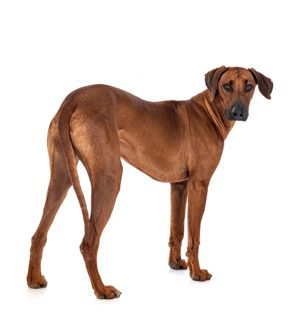
The Rhodesian Ridgeback is a large, muscular hunting dog breed that was developed in South Africa. It is known as the “Lion dog” because of its use to track and repeatedly bay at lions in the African bush. This breed has a ridge of hair running along their back which is their trademark feature. They have a short, dense coat which may be red wheaten, light wheaten, or even silver. They have a deep muzzle, broad head, almond shaped eyes, a black nose, and ears that stand erect. They can reach up to 27 inches tall and weigh around 85 to 95 pounds. Some of the breeds used to develop the Rhodesian Ridgeback are the African Hairless, the Great Dane, and the Boerboel. The Rhodesian Ridgeback stands out for its impressive strength, stamina, and loyalty. They are also known for their independence and intelligence which can make them difficult to train. All of these traits make the Rhodesian Ridgeback a one-of-a-kind breed.
The Rhodesian Ridgeback is an intelligent, active, and strong breed known for their playful and loyal personality. They are very patient and tolerant yet also possess a strong guarding capacity, which is why early socialization and training are so important. They are very friendly and gentle, but may be wary of strangers. They usually get along well with other pets and children, as long as they are raised together and exposed to everyone when they are young. Because of their active nature, Rhodesian Ridgebacks need regular exercise and mental stimulation to stay satisfied and healthy. This makes them an ideal breed for people who love to be outdoors and active. Daily walks or runs are recommended to help them burn off energy. Some owners may be able to take them out for longer hikes on trails. It is also important to ensure they receive the necessary mental stimulation through toys and activities of their own. Rhodesian Ridgebacks may be kept indoors if their exercise needs are met, but they may bark or whine out of boredom if they do not get enough physical activity. These loyal and devoted dogs form strong bonds with their owners, which makes them an excellent choice for anyone looking for an active and loving companion.
The Rhodesian Ridgeback is an active and loyal dog breed known for its intelligence and hunting abilities. To maintain their health and wellbeing, it is important to feed them a balanced and nutritious diet. The optimal diet should include protein sources, healthy fats, fiber, minerals, and vitamins. Because these active dogs have a high metabolism, they require between 1.5 and 2.5 cups of high-quality dry dog food per day, divided into two meals. Feeding them between these amount ranges not only helps keep their weight in check but also provides proper nutrients. For responsible ownership, meeting the nutritional standards is essential. Owners should also monitor their dogs’ activity level and change their feeding schedule accordingly. Ultimately, finding the right diet for your pet is a matter of trial and error. To ensure your dog is getting the nutrients they need, visit Way Canina to learn more about their diet and what foods to feed or avoid. By doing so, you can ensure your pet is eating the right things and having an optimal and healthy diet.
They are predisposed to certain health issues, such as hip and elbow dysplasia, cataracts, congenital heart disease, and others. Regular veterinary check-ups and preventive care is essential in minimizing the risks of these issues. Vaccinations are also important for your dog, as well as keeping their environment and lifestyle safe and secure. Grooming is also an essential part of keeping your Ridgeback healthy. Brushing their heavy coat, regular bath times, trimming their nails, and cleaning their ears are all important in keeping them looking and feeling their best.
The Rhodesian Ridgeback is a medium- to large-sized breed of dog with an average lifespan of 10-12 years. A balanced diet that is tailored to their age and activity levels, portion control, and daily exercise are important in preventing obesity. Exercise not only keeps them fit, but also mentally stimulated. At all stages of life, keeping up with preventive care, grooming, and nutrition will help ensure your Ridgeback’s longevity.
Owning a Rhodesian Ridgeback can be a big responsibility, but also a rewarding and enjoyable experience. Before taking the leap of bringing one home, it’s important to consider the pros and cons of this breed – from the good-natured but independent personality to the significant amounts of exercise they require. If you’re thinking about getting a Rhodesian Ridgeback, make sure to check out our blog posts and articles on Way Canina for more comparison between breeds and helpful information about dogs’ lifestyle and wellbeing.